
Jason Levinthal Interview
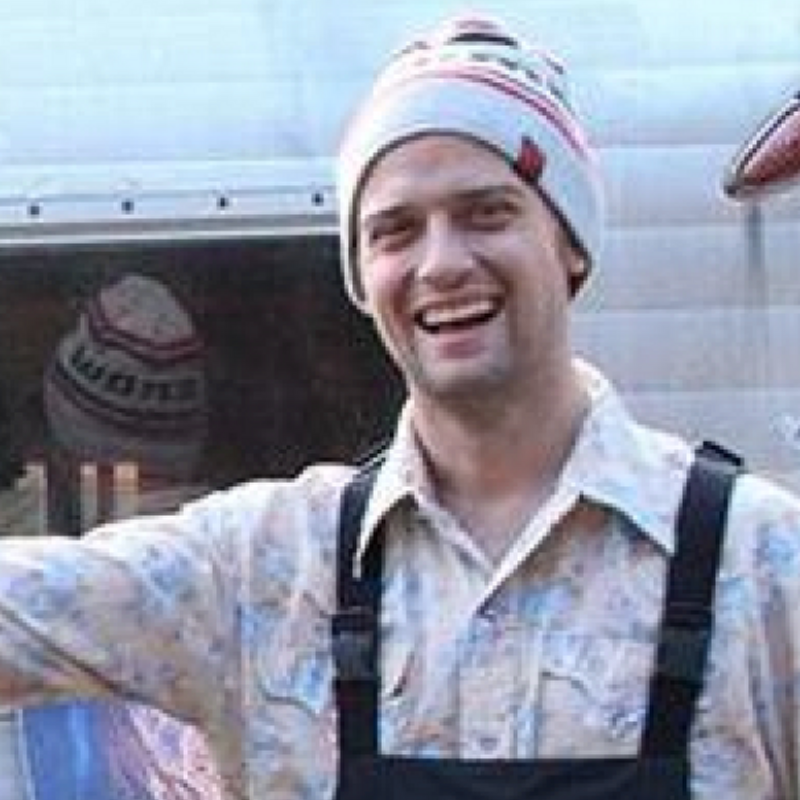
Words BY:
Todd Heath
A candid conversation with skiing’s ultimate entrepreneur about Wall Street, microbrews, in-efficient business models, and the importance of keeping our sport spry.
BOMB SNOW: Where do you see the future of our sport headed?
JASON LEVINTHAL- The funny thing is, this used to be the easiest question EVER. It was so easy— it was so obvious, and it was so…not where it would ultimately have to go. You would just describe basically what was happening 10 years ago, which was pretty obvious to me and the group of people living it day in and day out, but not obvious to others, so it was really eye-opening to everyone else. But now when I get asked that question it’s actually a lot harder because evolution and progression is never over. But we’ve certainly accomplished so many things that we felt like were gonna take a long time, or almost felt like were never gonna happen, or felt like, “Yeah…there’s these people that get it, but so many other’s don’t…like, we have such a long way to go”. But now, I feel like we’ve actually gone pretty damn far, ya know? It’s like 99%—if not more than 100%, of where I was hoping it would get someday…at least for a large enough percent of the skiers out there; their mindset and awareness of what skiing is.
So right now, we’ve been so busy working on getting here that we’re like: “Okay, we are here, this is actually happening”. I mean, the reality of skiing is…it is just skiing…It’s not something that everyone is ever gonna do. Ya know what I mean? It’s always gonna be super niche, andif nothing else, it’s probably gonna get more niche.
When I say niche, I mean you can be in a cold weather place and tons of people still won’t ski…let alone the places there is no skiing. So it’ll always be this hard to touch, hard to reach, almost out-there thing for a lot of people, and so it’s never gonna be mainstream. I don’t care how many TV shows it’s on, I don’t care how many X Games or ESPNs or whoevers writing, or blogs there are. I don’t care if it’s in the Olympics, it’s not ever gonna be baseball or football. That level of awareness, it’ll never get there. There’s so many barriers to entry, from the weather to ya know, just everything about it. It’s a really high maintenance sport to get into. And then, with the risk of global warming and things like that…I mean now I’m getting political and economic…
SO NOW, MOST OF THE BIG SKI COMPANIES—THE TOP TEN SKI COMPANIES—ARE PUBLIC. ONCE THEY'RE PUBLIC, THEY'RE NOT WORKING ON SKIING ANYMORE, THEY'RE WORKING FOR WALL STREET.
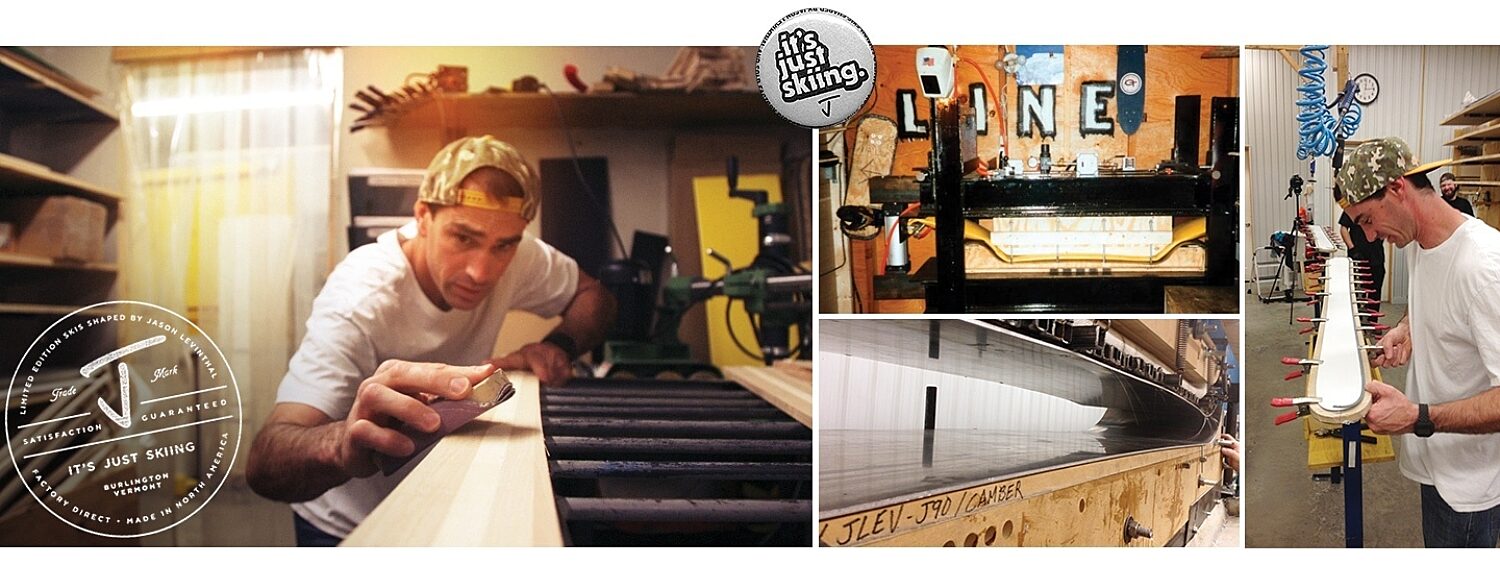
WITHOUT COORS OR BUDWEISER TODAY IT'D BE PERFECTLY FINE, BUT 10 YEARS AGO YOU NEEDED THOSE GUYS. YOU NEED ALL OF THE SALOMONS AND K2's AND ROSSI'S NOW, BUT HOPEFULLY IN 10 YEARS YOU WON'T NEED 'EM, BECAUSE, HONESTLY, THE MONEY ISN'T GONNA BE THERE FOR THEM. THERE'S NOT GONNA BE ENOUGH VOLUME FOR THEM TO BE STOKED.
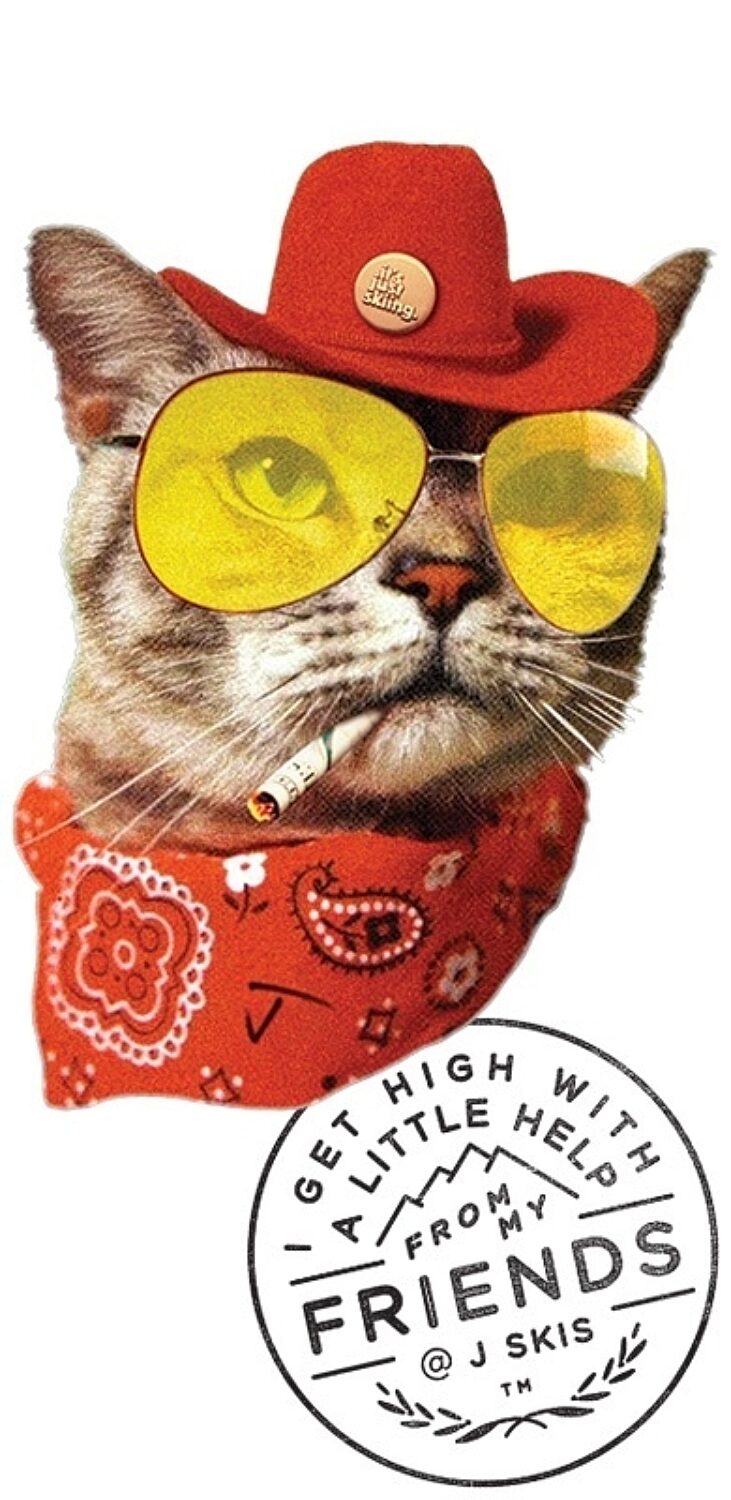
BS: Yeah, but we all think about it (global warming) as skiers-
J- Yeah, I’ve never even said this…this is just shooting off the top of my head here: When you think about potential for global warming, you think about the 1% that’s getting rich versus the 99% who are getting poorer everyday…in the scale of things in America, there’s less money to go skiing. There’s less weather for skiing, and there’s more competition going against it as far as entertainment value, especially for kids. So, there’s ultimately gonna be less skiing, and that means less investment that companies can put back into the sport, which you’re already seeing. At this point, companies can’t quite afford to be private, so they’ve started going public. So now, most of the big ski companies—the top ten ski companies— are public. Once they’re public, they’re not working for skiing anymore, they’re working for Wall Street. I don’t care who owns what, ultimately less money is being invested back into skiing by those massive companies, so the future of the sport is gonna rely on the microbrew brands. Whether it’s skis, outerwear, or anything relating to skiing, it’s requiring more small brands and companies— like you, like me, and all the other start-ups to fuel the sport and keep the few people that are doing it, doing it, and motivated and stoked on it because the big guys don’t have the motivation.
When you’re a public company, you own like 20 different brands or more, and you don’t need skiing to be big, and you don’t need it to be successful, you just wanna make as much as you can off of it and not give back. The small companies, who unfortunately don’t have as much money, are trying to give back. They’re the ones that are getting skiers stoked, so those skiers are gonna give back to those small companies. So, I’m trying to figure out a way to be small and profitable so that the other companies can do the same, and we can have like, a ton, a plethora of microbrews, just like you see in beer.
Without Coors and Budweiser today it’d be perfectly fine, but 10 years ago you needed those guys. Well, you need all of the Salomons and the Rossi’s and the K2’s today or even yesterday, but hopefully in 10 years you won’t need ‘em, because, honestly, the money isn’t gonna be there for them. There’s not gonna be enough volume for them to be stoked.
BS: I totally agree-
J- I guess I think it’s going microbrew, and I think, all of the athletes and, there’s so many perspectives, but the athlete perspective it’s going the same direction. Each athlete is his/her own marketing machine. Each athlete is marketing themselves better than any sponsor that could possibly support them. And so, you become your own brand of sorts. You can be selling and promoting your own products, and making your own money off of your own designs, ya know, if you have that kind of creativity.
BS- This trend is obviously not going away anytime soon. Do you think this kind of Micro-marketing helps a small direct-to-consumer company like yours?
J- Yeah! Yeah, I mean, anyone that I give skis to, the number one thing I ask for in return is just video, and I’ll promote them, I actually do promote guys a ton. But, I’m in that game, I mean I’m only in that game, so I’m focused on it but, otherwise, yeah— there’s plenty of athletes that have way more reach than the brands themselves online. And online is the way people communicate so, there it is. It’s crazy, like, I sell LOOK Bindings, and they don’t even have an Instagram page.
- This is the end of Round 1 of our 5 part Interview. Tune in Next Friday, Jan 29th, for round 2. - Bomb Snow
BS- Last time we chatted, we were talking about how the trade shows may or may not be doomed. How will that impact your company?
J- Well, I think, trade shows purely exist for an efficient way for brands to sell to retailers, and show product to retailers. They don’t even necessarily buy anything anymore at shows. It’s an outdated model. I mean, obviously, you can send someone a PDF, ya know, or call ‘em on the phone. You can do it other ways—and that’s the problem right now, it’s overkill. First, there’s a pre-show to show it, then there’s private demos and regional demos, then you go to the National SIA trade show, and the on-snow demo after that. Then there’s a local demo, and a local show after that to finally order it. And you know what you’re doing? You’re ordering 80% of your product that’s the same shit as last year but with a different graphic. Are you really gonna exert that much energy, time and resources, be away from your shop and from promoting to consumers, just to talk to yourselves? Just to talk to each other?
We need to get out there and promote to new people, not like talking to each other and ourselves about how great we are. I just think trade shows are inefficient and it’s an old business model, ya know what I mean? At some point there won’t be enough sales to justify it. Or there’ll be enough technology to get along without it.
MY COSTS ARE TOO HIGH WITH MY SMALL VOLUME. THAT'S THE PROBLEM WITH A LOT OF SMALL COMPANIES. IN ORDER TO SELL TO RETAILERS, BECAUSE YOUR MARGINS ARE LOWER, YOU NEED HUGE VOLUME. YOU HAVE TO SELL 20,000 SKIS A YEAR, AND THAT'S JUST NOT REALISTIC. IT TAKES DECADES TO GET TO THAT POINT.
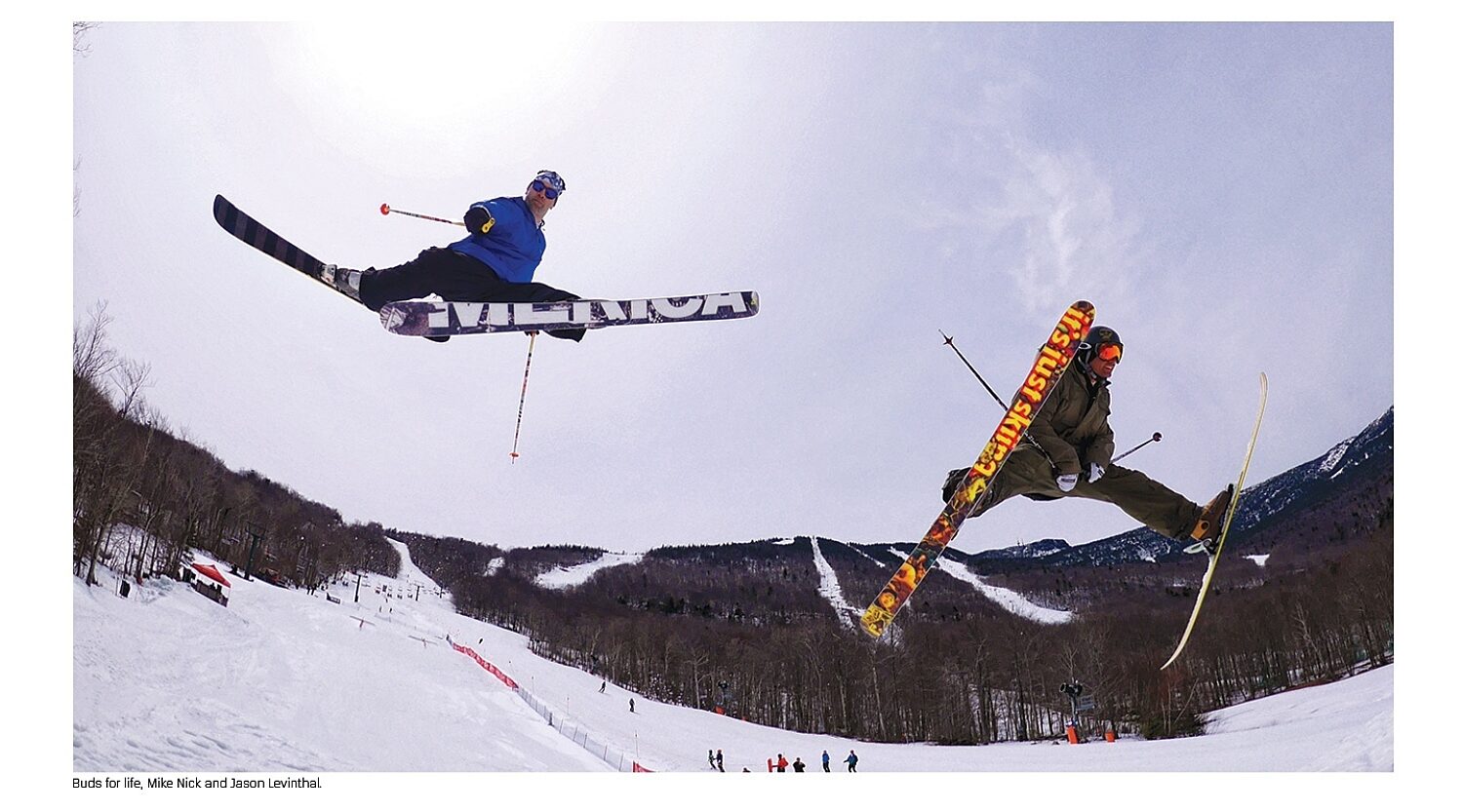
BS- Would it hurt your company if everyone started selling directly to consumers.
J- No, I don’t care! Everyone better do it. If people aren’t selling to reps, that’s like driving a car with horses instead. I mean, what are you doing? People buy online, so you’re just gonna decide not to sell product? Either you’re in business to sell product and to get people on your product or you’re not.
Look, I wish I could sell to retailers, I’d like to. But I don’t make enough money doing it. My costs are too high with my small volume. That’s the problem with a lot of small companies. In order to sell to retailers, because your margins are lower, you need huge volume, so you have to sell 20,000 pairs of skis a year, and that’s just not realistic. It takes decades to get to that point. That’s what it took for Line, and it’s hard to finance yourself. For literally 15 years you’re not profitable simply because you’re selling it to a store, thus making less money. So, selling direct, for me, is the formula. It’s the only way to make a small, low volume company profitable.
BS- But where does that leave shops in the future? How do we work together?
J- Shops are critical. I think there will always be shops and there should be shops. They’re the ones who can talk face to face with people, fit peoples boots, and mount their bindings. These are the people that can get people into skiing. I got no problem with shops. I don’t think they are going away at all. Every retailer needs to sell direct. And shops need to sell to people that walk into the store, that’s what they’re there for. It’s not all or nothing on any distribution model.
I mean for me it is, but I can’t afford the other one. But for a retailer, there’s plenty of brands that can afford to sell to them at a low enough price where they’ll make money and I know a lot of shops that think it’s a great, profitable business, if operated correctly. I mean- the alpine shops in my town (Burlington, VT) lease 4,000 skis a year. 4,000 skis! 4,000 people can afford to go skiing because their kids are growing every year, and for one hundred and fifty bucks, they get on a pair of skis that’s their size and give ‘em back at the end of the year. So, I think these shops are fuckin’ awesome, it’s just, I can’t afford to sell to them for a tiny little margin for decades before I’m profitable.
- This is the end of Round 2 of our 5 part Interview. Tune in Next Friday, Feb 5th, for round 3. - Bomb Snow
FOR LITERALLY 15 YEARS YOU'RE NOT PROFITABLE SIMPLY BECAUSE YOU'RE NOT SELLING TO A STORE, THUS MAKING LESS MONEY. SO, SELLING DIRECT, FOR ME, IS THE FORMULA. IT'S THE ONLY WAY TO MAKE A SMALL, LOW VOLUME COMPANY PROFITABLE.
BS- I'm curious about what's driving you on a daily basis, other than your ski brand. Your entrepreneurial spirit is contagious.
J- Yeah, Well…it’s certainly not money, because I haven’t made any off of this other than paying the basic bills. What drives me is motivating other people to realize that they can do whatever they put their mind to. So local colleges will ask— “Hey, can you speak?”— and it’s easy for me to tell my story. I mean, I literally just tell my story, and the trails and tribulations I’ve encountered.
What I realized after I did one or two classes, was like, people would come up and say “Dude, I was so inspired, now I wanna do this, and I’ve always thought about doing that.” I look at them and I go, “Dude, that was me. I wanted to do something, I wanted to change something. I wanted to make something happen.”
There were people that definitely inspired me who were not even in the ski industry, and they helped me motivate myself and just realize like, wait, why not, fuck it. I’m just gonna go for it. And so, if all I gotta do is tell my story to help other young people realize it’s just a matter of doing it, and you don’t have to be a rocket scientist, I’m gonna keep telling it. You gotta be persistent, You gotta have ingenuity, you gotta love what you do, and you can’t give up. It’s just good to help people that you look at and go, “That was me”.
Every skier I market to is me. Like, I’m 42. I’m old now. I’m marketing and selling products to 16-year-old kids that have posters on their walls just like I did. I want to give them the next rule to light their fire, ya know, fire them up to do whatever it is they have vision for. Whether it’s skiing or starting a company, or doing whatever. If you’re not inspiring other people like you were inspired, then it’s gonna end. You have to give back. You have to complete that circle. Otherwise, there will be a generation that doesn’t have the amazing experience that we’ve had. I don’t want to be the last one to live that life. I love being stoked for winter and loved being in high school and getting autographs from pros at movies, and learning a new trick, or seeing a new graphic and being psyched about the new pro model. That’s all awesome stuff I’m trying to keep alive. Whether I do that through my ski company or talking to schools about what I’ve done and talking to kids when they come up to me.
Business people come up to me all the time. I mean, I say I do consulting, but it’s basically just telling them whatever I think. Like, they say “Hey, I got this challenge, this is what I wanna do, what do you think?” I just puke it out, and there it is: This is what I learned, this is what I would do in your situation, these are the options I think you have, and hopefully that helps you move forward.
IF ALL I GOTTA DO IS TELL MY STORY TO HELP OTHER YOUNG PEOPLE REALIZE IT’S JUST A MATTER OF DOING IT, AND YOU DON’T HAVE TO BE A ROCKET SCIENTIST, I’M GONNA KEEP TELLING IT. YOU GOTTA BE PERSISTENT, YOU GOTTA HAVE INGENUITY, YOU GOTTA LOVE WHAT YOU DO, AND YOU CAN’T GIVE UP. IT’S JUST GOOD TO HELP PEOPLE THAT YOU LOOK AT AND GO, “THAT WAS ME”.
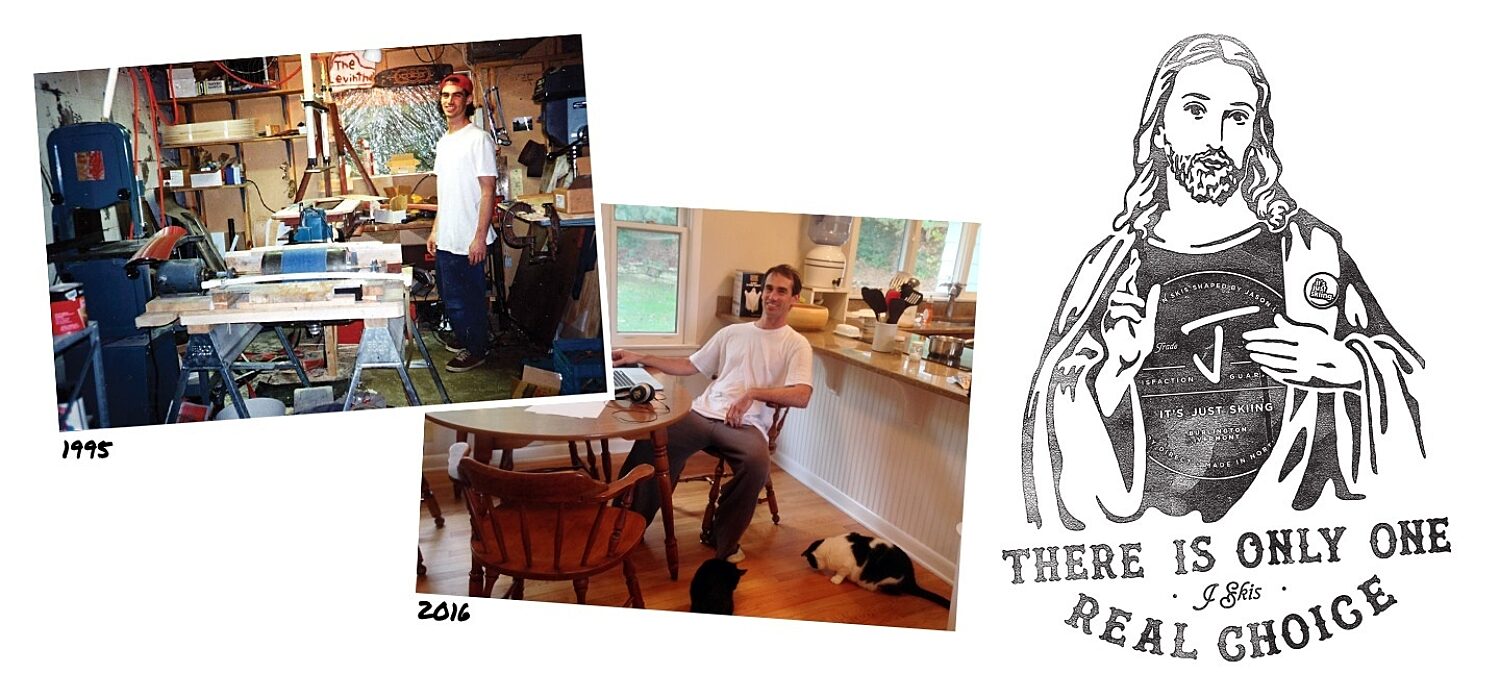
BS- One of the things I want to learn more about was when you said- “Exploit the competition’s strengths as weaknesses”, can you explain?
J- Haha, yeah, so even the guys from Amazon will say- “If there’s 100 people in your space, in your business market, and you’re number 101, what are you gonna do different?” If you’re not gonna do something different, there’s no reason for anyone to need you. And not only do you need to be different to stand out, but if you don’t do things different, you’re gonna end up battling your competition on their playing field, and they are already—usually— masters of that.
Let’s just say you’re talking about marketing. Maybe they don’t have the coolest ads, but they have the most money. They are gonna out spend you. They’re gonna out something you. So, if you try to battle them on their strengths, you’re gonna lose, so you have to create a different playing field, and that means doing the opposite. So let’s say I would exploit a traditional company for having a big pro team that costs a lot of money, all of their focus is on it, it’s only say- 5 big athletes, and they can’t pay attention to the local heroes….because their strength is that they can get the best athletes in the world. My weakness is that I can’t. So, I’m gonna say, “While they’re focused on the pros, I’m gonna ignore the pros and go after the local heroes. I’m gonna have the best kid at every single mountain.”
So I’m exploiting the fact that they’re ignoring the locals. I’m exploiting the fact that they’re only focused on the pros, so now, I’m gonna own the local scene. Or they’re gonna go all print ads, I’m gonna go all digital. They’re gonna sponsor big movies, I’m not gonna be in movies. I’m putting the same amount of money into let’s say- YouTube videos. So you gotta realize- Whatever they’re doing, do the opposite. They have big budgets, you have flexibility. They speak to dealers, you speak to consumers. They are everything to everyone, we are everything to the influencers.
I mean, you know what get’s you to that point? You have nowhere else to go.
Desperation forces you to find another way. That’s what I’ve learned after years and years of beating my head against the wall.
BS- How has running J-Skis improved the happiness or the quality of your life?
J- Haha, I’m tired as hell. I’m so exhausted, mentally and physically, it’s ridiculous. Now that I’m older and I have a family, I have a ten year old boy, it’s just different when you’re 25 starting a business. I’ve got a lot on the line, I need to make a living out of this. This isn’t college-style where it’s like “Whatever, I can pay myself nothing”. It’s high-stress; it’s around the clock, and selling direct never ends. It’s incredibly relentless.You’re literally selling one product at a time, to one person at a time. If you think about that, ya know, compared to selling to retailers, it was kind of evened out.
BS- Right, it was all at once.
J- Yeah- In the spring you’d get orders, then you’d go build it. You know you have the order. I have to go build my skis before I get orders. I have to take huge risks, borrow a huge amount of money, with no orders, hoping that I’m gonna guess right, and the right amount of people are gonna buy the right models. And I’ve gotta convince each person, one at a time.
It’s intense as hell, but it’s very gratifying, and I wouldn’t go back because I know this is gonna work. It’s just like an art project. It’s a hobby as much as it is a job. It’s something I’d want to do anyway, and I’d be bored doing it a safer way or another way. You end up having to become so comfortable in an uncomfortable situation. There are no guarantees. That’s what an entrepreneur is. That’s what you (Bomb Snow) are too. Ya know, you wake up at 3 in the morning and your heart is pounding because you start realizing how much risk you really took, in the heat of it, during the day you don’t think about it, but when you stop and take a step back and you’re lying in bed, you’re like, “Oh my god dude, I could be completely fucked!” Hahaha, I mean, it’s just ugly sometimes!
BS: HAHAHA- All we can hope for is that our friends and family understand us to the point of our nuttiness, right?
J- Haha…of your addiction, exactly. If I wanted to make money, which I think I do, like I always say I really do, I wouldn’t be doing this. I wouldn’t be involved in a business that only sells things four months a year, it makes no sense.
 MORE FROM BOMB SNOW
MORE FROM BOMB SNOW




